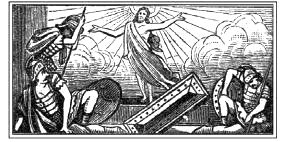
| Contents | Audit tyrannus anxius With Terror Doth the Tyrant Hear |
Hymni |

This hymn has seen several different forms, all ultimately deriving from the Hymn for the Epiphany from Prudentius' (384-413) Cathemerinon, which is 52 stanzas long. In 1568, four short hymns were assembled from selected stanzas from Prudentius' hymn and introduced into the Breviary by Pope Pius V. Two of these hymns, Audit tyrannus anxius and Salvete, flores Martyrum, were assigned for the feast of the Holy Innocents (Dec 28) for Matins and Laudes respectively. With the subsequent revision of the Liturgy of the Hours, these later two hymns were fused into the hymn below which is used at Laudes for the aforementioned feast
|
| AUDIT tyrannus anxius adesse regum principem, qui nomen Israel regat teneatque David regiam. |
WITH terror doth the tyrant hear the King of kings hath come to dwell where David's court shall widely rear A sceptered reign o'er Israel. |
| Exclamat amens nuntio: <<Successor instat, pellimur; satelles, i, ferrum rape, perfunde cunas sanguine! >>. |
Then cries out, raging at the word: "He comes to stand where we have stood: Hence, soldier, and with ruthless sword deluge the cradles deep with blood!" |
| Quo proficit tantum nefas? Quid crimen Herodem iuvat? Unus tot inter funera impune Christus tollitur. |
What profiteth a crime so dread? What hope shall Herod's bosom sway? Alone amidst the thronging dead, The Christ is safely born away! |
| SALVETE, flores martyrum, quos lucis ipso in limine Christi insecutor sustulit ceu turbo nascentes rosas. |
ALL hail! ye infant Martyr flowers Cut off in life's first dawning hours: As rosebuds snapt in tempest strife, when Herod sought your Savior's life. |
| Vos prima Christi victima, grex immolatorum tener, aram sub ipsam simplices palma et coronis luditis. |
You, tender flock of lambs, we sing, first victims slain for Christ your King: beside the very altar, gay with palms and crowns, ye seem to play. |
| Iesu, tibi sit gloria, qui natus es de Virgine, cum Patre et almo Spiritu, in sempiterna saecula. Amen. |
All honor, laud, and glory be, o Jesu, Virgin-born to Thee; all glory, as is ever meet, To Father and to Paraclete. |
| Latin: Liturgia Horarum. Translation by Msgr. Hugh Thomas Henry (1862-1946), J. M. Neale (1818-1866), and others. |
<- Prev |
Next-> |
